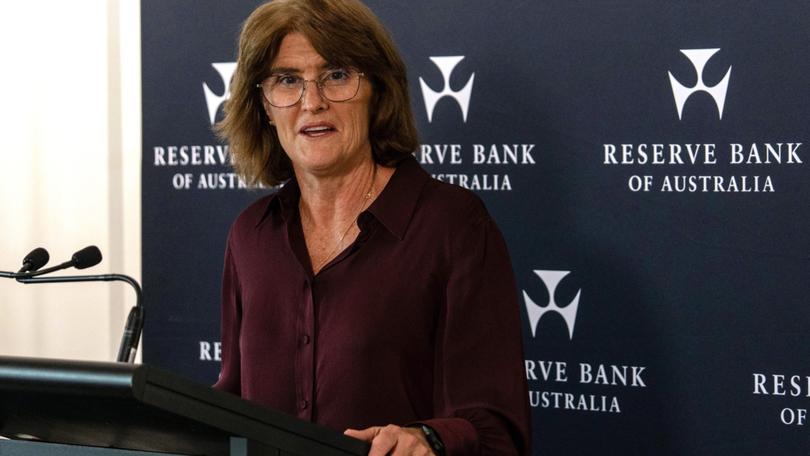RBA interest rates: Bank board holds cash rate at 4.35pc amid global market turmoil
Reserve Bank boss Michele Bullock has hosed down hopes interest rates will be cut this year, declaring that stopping inflation remains the top priority.

Reserve Bank boss Michele Bullock has hosed down hopes that interest rates will be cut this year, declaring that stopping inflation remains the top priority.
The central bank defied days of drama in international financial markets by holding the cash rate steady at 4.35 per cent.
“A rate cut is not on the agenda in the near term,” Ms Bullock said, revealing the central bank had only considered a hold or a hike at the meeting this week.
Sign up to The Nightly's newsletters.
Get the first look at the digital newspaper, curated daily stories and breaking headlines delivered to your inbox.
By continuing you agree to our Terms and Privacy Policy.Ms Bullock said she felt for households under pressure and the RBA was fighting so families would not see the prices of essential items keep rising.
“The longer inflation remains elevated the more it hurts everyone, all Australians,” she said.
“We really need to stay the course in this, to try and bring inflation back down.”
Inflation is projected to return back to the 2 per cent to 3 per cent band by the end of 2025 — that’s marginally later than the central bank had predicted at the last meeting in June.
The RBA’s analysis said stronger than expected demand was pushing the timeline for inflation to fall.
It comes after data last week showed headline prices have been accelerating, lifting 3.8 per cent in the past 12 months.
Punters in Perth were hardest hit, with home building and healthcare costs on the way up.
But there was some brighter news in the RBA’s forecasts, too.
Economic growth was expected to be stronger than previously thought.
Household spending is set to recover, and the jobless rate was unlikely to lift above 4.4 per cent.
That means the bank’s fabled “soft landing” — stopping inflation without crashing the economy — could be in sight.
This month’s RBA board meeting was set against a backdrop of panic across share markets, after softer jobs growth figures in the United States sparked talk of a recession.
The ASX200 lost a staggering $160 billion of value over two days but recovered 0.4 per cent in Tuesday trade.
Ms Bullock, pictured, said she did not believe Australia was headed for recession.
“It was one employment number in the United States,” she said, adding that investors were adjusting expectations and slashing debts.
“We need to have a little bit of caution and a little bit of calm.”
Treasurer Jim Chalmers said there had been encouraging progress in the fight against inflation but warned Australia was not immune from global pressure.
“(We) are confident Australia will see a soft landing for our economy, but this volatility around the world is a warning against complacency,” Mr Chalmers said.
Shadow treasurer Angus Taylor said Federal and State Governments splashing cash was fuelling rising prices.
“It is clear that inflation is running the economy, not the government,” he told journalists.
He said the economy needed to grow faster than spending.
“We’re seeing spending growth under this government of 16 per cent in two years and . . . enormous growth in spending from State governments, which is continuing to fuel inflation,” Mr Taylor said.
Ms Bullock was diplomatic when asked to weigh in on government largess, saying it partly offset weak private demand and was not necessarily adding to inflation.
But the bank’s broader outlook partly attributed higher demand to rising government spending.
Economists are at odds about what the RBA should — and will — do next.
Westpac said its forecasts for interest rates were under review. “Our expectation of a November rate cut is unlikely to be achieved,” the bank said.
AMP chief economist Shane Oliver rang the alarm on Tuesday morning, warning there was a 50-50 risk of a recession in the US and Australia.
He argued the RBA ought to move faster to cut rates but predicted a move would likely not come until February.
Commonwealth Bank’s Gareth Aird said the picture could change rapidly, adding that the economic data “could evolve in a way that sees the RBA cut the cash rate in November”.
The nation’s biggest bank has maintained a forecast for rates to fall in that month although Mr Aird said the RBA had been “more hawkish” than anticipated.
But Moody’s Analytics economist Harry Murphy Cruise said “it’s clear there is growing angst within the bank that inflation is digging in its heels,” he said.
“(N)ew forecasts from the RBA show the retreat of underlying inflation to target has been pushed back, while growth in domestic demand has been revised higher.”
The consultancy was “still of the view that it’s more time, not more hikes” would tame inflation.
